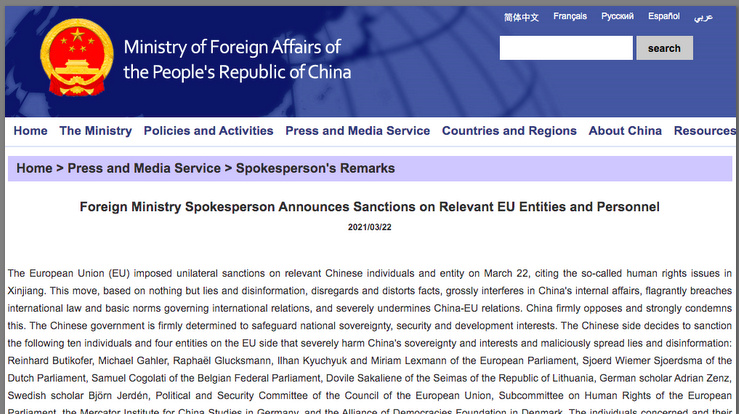China's response to EU sanctions is appropriate
By Bradley Blankenship | CGTN | Updated: 2021-03-23 14:10

European Union foreign ministers agreed on March 22 to impose sanctions on four Chinese individuals and one entity over alleged human rights abuses against China's Uygur minority in Xinjiang Uygur Autonomous Region, which are the latest sanctions against China since an arms embargo about three decades ago.
Though this decision will hardly impact China's economy, it reflects how serious the threat of the Western world's hybrid warfare against China is and underscores why China imposed heavier measures in return.
To be clear, the threat posed by countries buying into dubious claims about "human rights abuses" is that it implies that "somebody" has to do "something," which has historically been a stand-in for Western countries to invade other countries, those in the Global South, on humanitarian pretenses.
On March 19, the 10th anniversary of the NATO-led invasion of Libya, it was revealed that secret negotiations took place that would have seen a peaceful transition of power in the country. Speaking to The Independent, former Norwegian foreign minister Jonas Store said that then-Libyan leader Muammar Gaddafi and NATO-backed opposition forces agreed to a deal, with the help of his office, that would have seen Gaddafi exit power peacefully if state institutions were kept in place.
The deal was rejected, according to Store, because of pressure from the UK and France. Of course then-UK Prime Minister David Cameron and then-French President Nicolas Sarkozy both deny this account, but if true – and there is no reason to doubt Store's account – these countries had apparently sought regime change at all costs, which has resulted, even still after 10 years, in Libya being a failed state.
Once one of Africa's most thriving countries, Libya is now a terrorist incubator and slave trade destination because of NATO's recklessness, which was spearheaded by EU member states. It shatters any idea that NATO intervened in Libya to save civilian lives or even to simply remove Gaddafi. It was clearly about destroying Libya the entire system that posed "a threat" to Western imperialism by daring to pursue independent development.
We might even recall another important date in March. March 20, which is the anniversary of the invasion of Iraq. On the false pretense that then-Iraqi leader Saddam Hussein had "weapons of mass destruction," the U.S. pushed for regime change in Iraq, which of course turned out to be a total fabrication. In fact, the U.S. and UK media ran countless fabrications to drum up war with Iraq.
For example, there was a story about Saddam Hussein's "human-shredding machine," a plastic shredder or wood chipper (it varied depending on the article) that he would use to chop up his political opponents and, according to a story in the The Times titled "See men shredded, then say you don't back war," use their remains as fish food.
These kinds of allegations were never seriously corroborated, but they did manage to successfully shift public opinion in favor of war in many countries, including many countries in the EU.
As any person can admit, the Iraq War was a complete and utter disaster. Hundreds of thousands of innocent people died, millions have been displaced and the war itself only managed to destabilize the Middle East even further and entrench anti-Western sentiments.
Despite the mountain of evidence that both of these wars were complete disasters, and it was obvious at the time that they would be, those who criticized the official narrative were painted as unpatriotic or, worse, supporting violence against innocent people. And today this is basically the same treatment that people in Western countries face when they question alleged "human rights abuses" claims coming out in the Western media in regards to China's Xinjiang Uygur Autonomous Region.
This is because there is no actual basis to these claims, especially when you start to research them more in-depth and ditch the ideological blinders of Western media.
Instead, these bad actors rely on the fact that Westerners are already primed to see China with skepticism to spread egregious disinformation, thus creating "common knowledge" about China's alleged abuses that cannot be questioned since doing so would be conspiratorial – even though the allegations themselves are ridiculous and conspiratorial.
By sanctioning China over these allegations, which they are free to investigate themselves at any time but choose not to, EU foreign ministers are perpetuating this "common knowledge." Such common knowledge, however, has quite literally cost millions of people their homes, aspirations, even their lives, in the recent past. That's why China is responding so heavily, because pushing narratives like this are extremely provocative.
Make no mistake, "Xinjiang internment camps" are the new "weapons of mass destruction."
Bradley Blankenship is a Prague-based American journalist, political analyst and freelance reporter.
























